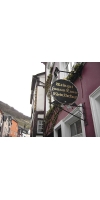Wine from Hansen-Lauer

The Hansen-Lauer Estate
Thomas Hansen is the third in the generation of the Hansen family to produce top quality wines at Weingut Hansen-Lauer in Bernkastel-Kues, overlooking the picturesque Mosel River.
Hansen-Lauer's two hectares of vines are situated amid the Germany's finest growing region which produces many of the best and costliest white wines in the world. Bernkastel-Kues, a picturesque village and tourist mecca overlooking the Mosel River, has long been the home of the finest Rieslings in Germany. Home of Germany's famed Wine Symposium, Bernkastel is a community famed for its celebration of winemaking and good living.
Weingut Hansen-Lauer, with its perfect blend of soil and climate, produces white wines exclusively of the Riesling grape, carefully crafted by master winemaker Thomas Hansen. His expertise assures exquisite wines for the most discriminating wine lover.
The history of the winery goes back more than 400 years. Its 2 hectares of vines are situated around the medieval town of Bernkastel. 90% of the vineyards are planted with Riesling, the leading grape-variety of the Mosel-river. 10% is Spätburgunder, also known as Pinot Noir. Riesling is the wine of the Moselle. This wine is light, elegant and very fine. The most fascinating thing about Riesling is its great diversity of taste. Riesling can taste like a vineyard peach, apple, grapefruit, rose blossom, honey or cut green grass. This list is by no means exhaustive. Just taste it and use your own fantasy and imagination to describe your impressions of smell.
No products found
- back
Selected Options
Wineries
Categories
Pricing
Countries
Regions
Grape Types
Wineries
Organic/Free Shipping
Paul Hobbs West Sonoma Coast Pinot Noir is made from 100 percent Pinot Noir.
Hailing from the newly established West Sonoma Coast AVA,.
Lovely ruby red shades catch the eye, while exotic notes of tart Morello cherry and pungent pine forest swirl with fresh raspberry. Bright, pure fruit carries through on the palate, layered with earthy hints of damp loam and rocky salinity, all backed by the elegant, fine-grained tannins and stylish grip that cool West Sonoma Coast offers at its best.
Review:
A rush of sugared beet, pomegranate, and vanilla-soaked raspberry mingles with a touch of salinity on entry, while a soil component reflects the super-cool climate of the appellation. Power and elegance coexist in this red, which finishes with graphite, peony, basil, and exotic incense.
-Tasting Panel 97 Points
Corinne Perchaud Chablis 1er Cru Fourchaume is made from 100 percent Chardonnay
Elegant citrus aromas. Concentrated and finessed, combining flavors of dried fruit with slight hints of woody notes. Perfect balance between body and acidity, long and persistent finish. This one is drinking great now, but as with all exceptional Chablis, it is possible to pay it down for years to come.
Made from 35 year old vines. The owners take great care to produce exceptional Chablis wine by keeping the lively Chardonnay fruit and the unique mineral quality imparted by the Kimmeridgian soil, the fruity acidity and bouquet in perfect balance. The grapes are harvested by hand and gently pressed in a horizontal pressoir to ensure the fullest extraction and range of flavors and aromas.
Pair with Scallops Jacques cream, roast veal with oyster mushrooms.




